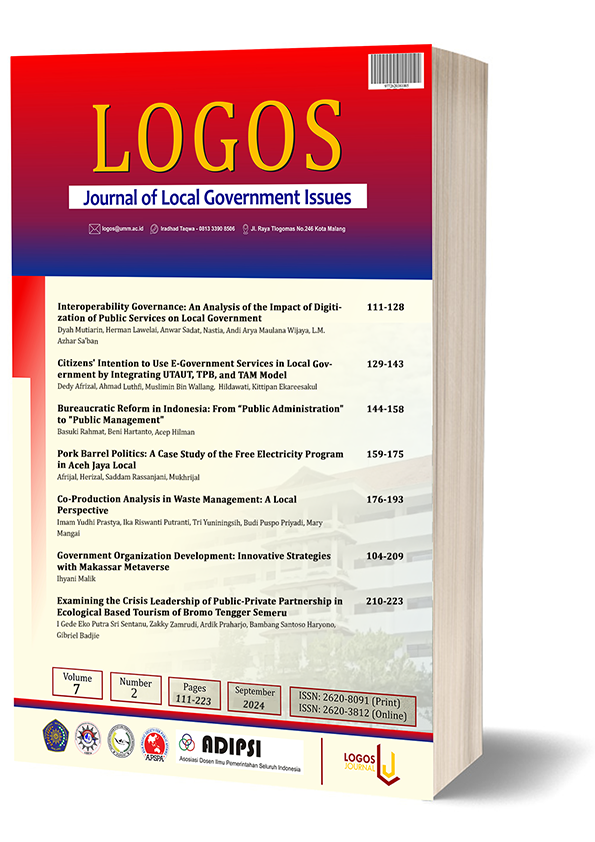Examining the Crisis Leadership of Public-Private Partnership in Ecological Based Tourism of Bromo Tengger Semeru
DOI:
https://doi.org/10.22219/logos.v7i2.32321Keywords:
PPP, Collaborative Governance, tourism governance, tourism network, tourism collaborative governanceAbstract
This study is aimed to evaluate the role of crisis leadership within the public-private partnership of tourism collaborative governance. This study employs a cross-sectional study involving 304 respondents from various stakeholder from Bromo-Tengger-Semeru National park (BTSNP). The study employs the SEM-PLS data analysis to evaluate the measurement model and structural model. The results of the study indicates that the important role of Public-Private partnership on collaborative governance is only indicated by several dimension, especially those of Governance, Mutuality, and Administration. However, the interaction moderation indicates that crisis leadership is only able to enhance the Mutuality and Norm and Trust. The further discussion related to the finding is elaborated within the papers. The originality of this paper is by presenting a picture of ecological tourism management in Indonesia through the lens of public-private-partnership.
Downloads
References
Abbas, J., Mubeen, R., Iorember, P. T., Raza, S., & Mamirkulova, G. (2021). Exploring the impact of COVID-19 on tourism: transformational potential and implications for a sustainable recovery of the travel and leisure industry. Current Research in Behavioral Sciences, 2, 100033. https://doi.org/10.1016/j.crbeha.2021.100033
Acar, M., Chao Guo, & Kaifeng Yang. (2008). Accountability When Hierarchical Authority Is Absent. The American Review of Public Administration, 38(1), 3–23. https://doi.org/10.1177/0275074007299481
Anderson, W., Busagara, T., Mahangila, D., Minde, M., Olomi, D., & Bahati, V. (2017). The dialogue and advocacy initiatives for reforming the business environment of the tourism and hospitality sector in Tanzania. Tourism Review, 72(1), 45–67. https://doi.org/10.1108/TR-09-2016-0036
Andres, L., & Chapain, C. (2013). The Integration of Cultural and Creative Industries into Local and Regional Development Strategies in Birmingham and Marseille: Towards an Inclusive and Collaborative Governance? . Regional Studies, 47(2), 161–182. https://doi.org/10.1080/00343404.2011.644531
Ansell, C., & Gash, A. (2018). Collaborative Platforms as a Governance Strategy. Journal of Public Administration Research and Theory, 28(1), 16–32. https://doi.org/10.1093/jopart/mux030
Arandel, C., Brinkerhoff, D. W., & Bell, M. M. (2015). Reducing fragility through strengthening local governance in Guinea. Third World Quarterly, 36(5), 985–1006. https://doi.org/10.1080/01436597.2015.1025741
Azazz, A. M. S., Elshaer, I. A., & Ghanem, M. (2021). Developing a Measurement Scale of Opposition in Tourism Public-Private Partnerships Projects. Sustainability, 13(9), 5053. https://doi.org/10.3390/su13095053
Azmat, M., & Ahmad, A. (2022). Pakistani Secondary Students’ Learning Performance and Satisfaction Amidst COVID-19 Outbreak: Sequential Explanatory Research. Journal of Educational Management and Instruction (Jemin). https://doi.org/10.22515/jemin.v2i2.5326
Berrone, P., Ricart, J., Duch, A., Bernardo, V., Salvador, J., Piedra Peña, J., & Rodríguez Planas, M. (2019). EASIER: An Evaluation Model for Public–Private Partnerships Contributing to the Sustainable Development Goals. Sustainability, 11(8), 2339. https://doi.org/10.3390/su11082339
Blackman, D., Kennedy, M., & Ritchie, B. (2011). Knowledge management: the missing link in DMO crisis management? Current Issues in Tourism, 14(4), 337–354. https://doi.org/10.1080/13683500.2010.489637
Bramwell, B. (2011). Governance, the state and sustainable tourism: a political economy approach. Journal of Sustainable Tourism, 19(4–5), 459–477. https://doi.org/10.1080/09669582.2011.576765
Bramwell, B., & Lane, B. (2011). Critical research on the governance of tourism and sustainability. Journal of Sustainable Tourism, 19(4–5), 411–421. https://doi.org/10.1080/09669582.2011.580586
Bramwell, B., & Sharman, A. (1999). Collaboration in local tourism policymaking. Annals of Tourism Research, 26(2), 392–415. https://doi.org/10.1016/S0160-7383(98)00105-4
Brinkerhoff, D. W., & Brinkerhoff, J. M. (2011). Public-private partnerships: Perspectives on purposes, publicness, and good governance. Public Administration and Development, 31(1), 2–14. https://doi.org/10.1002/pad.584
Brinkerhoff, J. M. (2002). Government-nonprofit partnership: a defining framework. Public Administration and Development, 22(1), 19–30. https://doi.org/10.1002/pad.203
Cannata, M., Cohen-Vogel, L., & Sorum, M. (2017). Partnering for Improvement: Improvement Communities and Their Role in Scale Up. Peabody Journal of Education, 92(5), 569–588. https://doi.org/10.1080/0161956X.2017.1368633
Cheng, Z., Ke, Y., Yang, Z., Cai, J., & Wang, H. (2020). Diversification or convergence: An international comparison of PPP policy and management between the UK, India, and China. Engineering, Construction and Architectural Management, 27(6), 1315–1335. https://doi.org/10.1108/ECAM-06-2019-0290
Creswell, J. W., & Clark, V. L. P. (2017). Designing and Conducting Mixed Methods Research. SAGE Publications Inc.
Davies, A. L., & White, R. M. (2012). Collaboration in natural resource governance: Reconciling stakeholder expectations in deer management in Scotland. Journal of Environmental Management, 112, 160–169. https://doi.org/10.1016/j.jenvman.2012.07.032
Della Corte, V., Del Gaudio, G., Sepe, F., & Luongo, S. (2021). Destination Resilience and Innovation for Advanced Sustainable Tourism Management: A Bibliometric Analysis. Sustainability, 13(22), 12632. https://doi.org/10.3390/su132212632
Deladem, T., Xiao, Z., Siueia, T. T., Doku, S., & Tettey, I. (2020). Developing sustainable tourism through public-private partnership to alleviate poverty in Ghana. Tourist Studies, 21(2), 317–343. https://doi.org/10.1177/1468797620955250
Dwyer, J., Short, C., Berriet-solliec, M., Déprés, C., Lataste, F.-G., Hart, K., & Prazan, J. (2020). Fostering resilient agro-food futures through a social-ecological systems framework: Public–private partnerships for delivering ecosystem services in Europe. Ecosystem Services, 45, 101180. https://doi.org/10.1016/j.ecoser.2020.101180
Gillespie, N., & Dietz, G. (2009). Trust Repair After An Organization-Level Failure. Academy of Management Review, 34(1), 127–145. https://doi.org/10.5465/amr.2009.35713319
Hair Jr., J. F., Matthews, L. M., Matthews, R. L., & Sarstedt, M. (2017). PLS-SEM or CB-SEM: updated guidelines on which method to use. International Journal of Multivariate Data Analysis, 1(2), 107. https://doi.org/10.1504/IJMDA.2017.10008574
Kapucu, N. (2011). Collaborative governance in international disasters: Nargis cyclone in Myanmar and Sichuan earthquake in China cases. International Journal of Emergency Management, 8(1), 1–25. https://doi.org/10.1504/IJEM.2011.040395
Kapucu, N., Arslan, T., & Demiroz, F. (2010). Collaborative emergency management and national emergency management network. Disaster Prevention and Management: An International Journal, 19(4), 452–468. https://doi.org/10.1108/09653561011070376
Khorram-Manesh, A., & Burkle, F. M. (2020). Disasters and Public Health Emergencies—Current Perspectives in Preparedness and Response. Sustainability, 12(20), 8561. https://doi.org/10.3390/su12208561
Kim, Y. H., Sting, F. J., & Loch, C. H. (2014). Top-down, bottom-up, or both? Toward an integrative perspective on operations strategy formation. Journal of Operations Management, 32(7–8), 462–474. https://doi.org/10.1016/j.jom.2014.09.005
Koontz, T. M., & Newig, J. (2014). From Planning to Implementation: Top-Down and Bottom-Up Approaches for Collaborative Watershed Management. Policy Studies Journal, 42(3), 416–442. https://doi.org/10.1111/psj.12067
Machin, D., Campbell, M. J., Tan, S. B., & Tan, S. H. (2009). Sample Size Tables for Clinical Studies: Third Edition. In Sample Size Tables for Clinical Studies: Third Edition. Wiley-Blackwell. https://doi.org/10.1002/9781444300710
Mariani, M. M., & Kylänen, M. (2014). The relevance of public-private partnerships in coopetition: empirical evidence from the tourism sector. International Journal of Business Environment, 6(1), 106. https://doi.org/10.1504/IJBE.2014.058026
Martínez-Ferrero, J., Ruiz-Cano, D., & García-Sánchez, I.-M. (2016). The Causal Link between Sustainable Disclosure and Information Asymmetry: The Moderating Role of the Stakeholder Protection Context. Corporate Social Responsibility and Environmental Management, 23(5), 319–332. https://doi.org/10.1002/csr.1379
Marx, A. (2019). Public-Private Partnerships for Sustainable Development: Exploring Their Design and Its Impact on Effectiveness. Sustainability, 11(4), 1087. https://doi.org/10.3390/su11041087
Mauldin, M. D. (2012). A new Governance Explanation for the creation of a minority economic development public-private partnership in Florida. Public Performance and Management Review, 35(4), 679–695. https://doi.org/10.2753/PMR1530-9576350406
Mora Cortez, R., & Johnston, W. J. (2020). The Coronavirus crisis in B2B settings: Crisis uniqueness and managerial implications based on social exchange theory. Industrial Marketing Management, 88, 125–135. https://doi.org/10.1016/j.indmarman.2020.05.004
Neupane, P. C. (2021). Tourism Governance in the aftermath of COVID-19: A Case Study of Nepal. The Gaze: Journal of Tourism and Hospitality, 12(1), 44–69. https://doi.org/10.3126/gaze.v12i1.35676
Olivier, C., & Burton, C. (2020). A Large-Group Peer Mentoring Programme in an Under-Resourced Higher Education Environment. International Journal of Mentoring and Coaching in Education. https://doi.org/10.1108/ijmce-07-2019-0074
Pambudi, A. S., Fikri Masteriarsa, M., Dwifebri, A., Wibowo, C., Amaliyah, I., Adhitya, D., & Ardana, K. (2020). Strategi Pemulihan Ekonomi Sektor Pariwisata Pasca Covid-19. Majalah Media Perencana, 1(1), 1–21.
Parks, C. D., Joireman, J., & Van Lange, P. A. M. (2013). Cooperation, Trust, and Antagonism. Psychological Science in the Public Interest, 14(3), 119–165. https://doi.org/10.1177/1529100612474436
Riggio, R. E., & Newstead, T. (2023). Crisis Leadership. Annual Review of Organizational Psychology and Organizational Behavior, 10, 201–224. https://doi.org/10.1146/annurev-orgpsych-120920-044838
Ritchie, B. W. (2004). Chaos, crises and disasters: a strategic approach to crisis management in the tourism industry. Tourism Management, 25(6), 669–683. https://doi.org/10.1016/j.tourman.2003.09.004
Sarwar, A., Muhammad, L., & Sigala, M. (2021). Unraveling the complex nexus of punitive supervision and deviant work behaviors: findings and implications from hospitality employees in Pakistan. International Journal of Contemporary Hospitality Management, 33(5), 1437–1460. https://doi.org/10.1108/IJCHM-08-2020-0808
Schneider, F., Kallis, G., & Martinez-Alier, J. (2010). Crisis or opportunity? Economic degrowth for social equity and ecological sustainability. Introduction to this special issue. Journal of Cleaner Production, 18(6), 511–518. https://doi.org/10.1016/j.jclepro.2010.01.014
Senbeto, D. L., & Hon, A. H. Y. (2021). Development of employees’ resilience in technologically turbulent environments: probing the mechanisms of consonance–dissonance and crisis leadership. International Journal of Contemporary Hospitality Management, ahead-of-p(ahead-of-print). https://doi.org/10.1108/IJCHM-11-2020-1263
Sentanu, I. G. E. P. S., Haryono, B. S., Zamrudi, Z., & Praharjo, A. (2023). Challenges and successes in collaborative tourism governance: A systematic literature review. European Journal of Tourism Research, 33(2023), 1–29. https://doi.org/10.54055/ejtr.v33i.2669
Torfing, J., Sørensen, E., & Røiseland, A. (2019). Transforming the Public Sector Into an Arena for Co-Creation: Barriers, Drivers, Benefits, and Ways Forward. Administration & Society, 51(5), 795–825. https://doi.org/10.1177/0095399716680057
uwto.org. (2021). 2020: Worst Year in Tourism History with 1 Billion Fewer International Arrivals. Unwto.Org. https://www.unwto.org/news/2020-worst-year-in-tourism-history-with-1-billion-fewer-international-arrivals
Valente, F., Dredge, D., & Lohmann, G. (2015). Leadership and governance in regional tourism. Journal of Destination Marketing & Management, 4(2), 127–136. https://doi.org/10.1016/j.jdmm.2015.03.005
Vargas, A. (2020). Covid-19 crisis: a new model of tourism governance for a new time. Worldwide Hospitality and Tourism Themes, 12(6), 691–699. https://doi.org/10.1108/WHATT-07-2020-0066
Verweij, S., van Meerkerk, I., & Casady, C. B. (2022). Conclusions about the performance advantage of PPPs. In The performance advantage of public-private partnerships: does it exist or not? (pp. 206–228). Edward Elgar Publishing. https://doi.org/10.4337/9781800889200.00017
Wan, Y. K. P., & Bramwell, B. (2015). Political economy and the emergence of a hybrid mode of governance of tourism planning. Tourism Management, 50, 316–327. https://doi.org/10.1016/j.tourman.2015.03.010
Wan, Y. K. P., Li, X., Lau, V. M.-C., & Dioko, L. (Don). (2022). Destination governance in times of crisis and the role of public-private partnerships in tourism recovery from Covid-19: The case of Macao. Journal of Hospitality and Tourism Management, 51, 218–228. https://doi.org/10.1016/j.jhtm.2022.03.012
Downloads
Published
How to Cite
Issue
Section
License
Copyright (c) 2024 I Gede Eko Putra Sri Sentanu, zakky zamrudi, Ardik Praharjo, Bambang Santoso Haryono, Gibriel Badjie

This work is licensed under a Creative Commons Attribution-ShareAlike 4.0 International License.
Authors who publish with this journal agree to the following terms:
- Authors retain copyright and grant the journal right of first publication with the work simultaneously licensed under a Creative Commons Attribution-ShareAlike 4.0 International License. that allows others to share the work with an acknowledgment of the work's authorship and initial publication in this journal.
- Authors are able to enter into separate, additional contractual arrangements for the non-exclusive distribution of the journal's published version of the work (e.g., post it to an institutional repository or publish it in a book), with an acknowledgment of its initial publication in this journal.
- Authors are permitted and encouraged to post their work online (e.g., in institutional repositories or on their website) prior to and during the submission process, as it can lead to productive exchanges, as well as earlier and greater citation of published work (See The Effect of Open Access).

This work is licensed under a Creative Commons Attribution-ShareAlike 4.0 International License.













